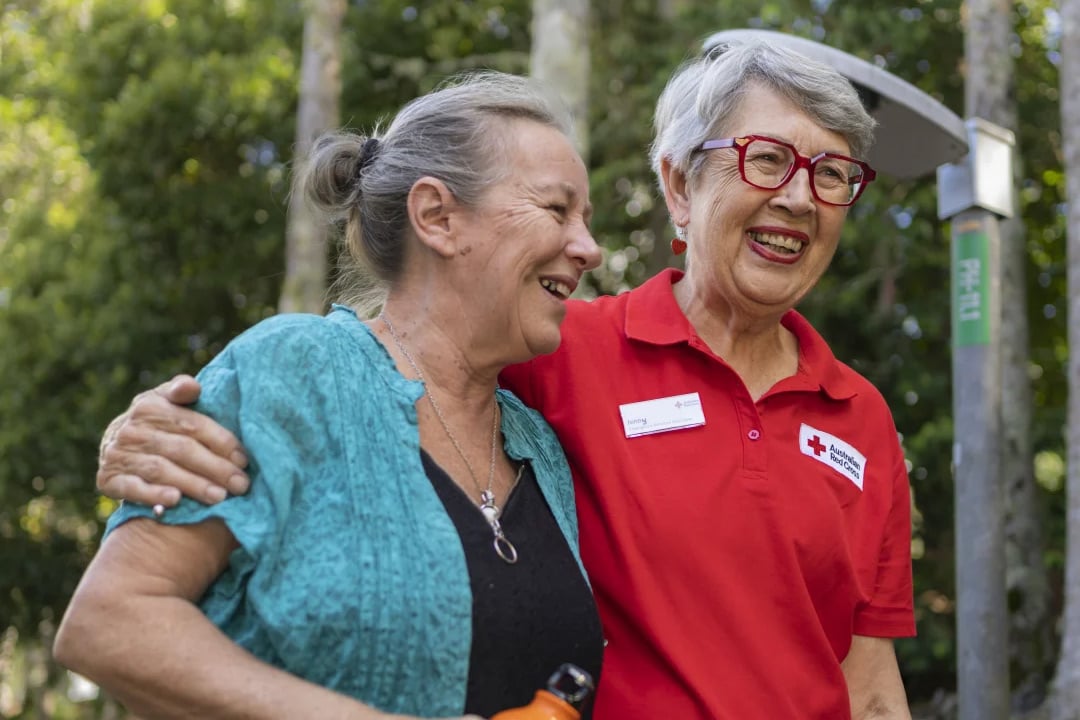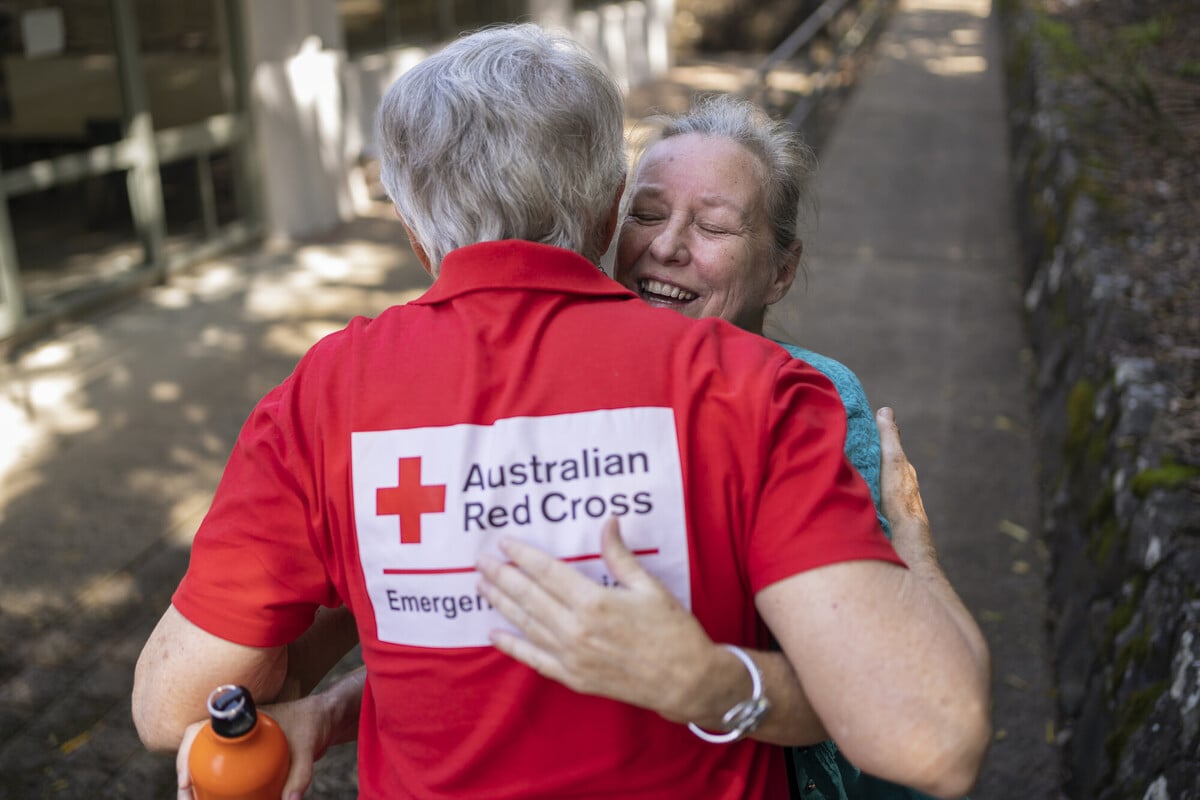Finding warmth after two disasters
The power of community shines through in Lismore in the wake of a cyclone and devastating flooding.
When Cyclone Alfred swept through Lismore in March, it left a trail of devastation. People evacuated as the Wilson River flooded again, bringing back painful memories of the 2022 floods. For Vicki, a long-time resident, the impact was personal, as she struggled with injury and damage to her car after the cyclone.
But Vicki wasn’t alone. Australian Red Cross was on the ground from the very beginning. As part of the Lismore community, Australian Red Cross team members had come to know Vicki well throughout the years, including across the 2022 floods. And they were there again, as the disaster spilled across the battered city.
As warnings came in thick and fast as Cyclone Alfred approached, Vicki, like so many others, found herself remembering the devastating impact of the 2022 floods. Three years ago, as the floodwaters rose, Vicki sat with a neighbour on the upper deck of her house, perched on top of a chair on top of a table, desperately trying to keep dry.
“The rain didn't stop, and it wasn't just normal rain, it was heavy, heavy rain,” she says. “We were on the table from about six in the morning until two o'clock in the afternoon.” With her health issues adding another layer of complexity to the situation, Vicki was overwhelmed. “I can't shiver to adjust my own body temperature. I was concerned about not getting too cold too soon.”
The recovery after the 2022 floods was slow, but there were moments of brightness as the community pulled together. “I can still remember that the first time I had dry socks and dry shoes,” Vicki recalls. “My feet had been in wet boots for five days. I couldn't walk. It was really painful. We stopped at a service station, where another girl overhead, and she said, come with me. I think I've got some shoes for you. And she gave me some new boots, which I've kept. They were just the best things, the best gift from a complete stranger.”

It was that care and comfort that Vicki needed as she headed to the Lismore Recovery Centre after Cyclone Alfred too. Having injured herself trying to check on a neighbour and with her car damaged, Vicki needed support. “When I first arrived up at the Recovery Centre at the university, I saw Jenny Dowell,” she says.
“She came straight over and gave me a hug and said, ‘Come on Vicki.’ She could see I was limping. I showed her my bruises down my arm, and she took me in.”
“I really appreciate having the Red Cross being there. When you first walk into any recovery centre, they're such warm-hearted, genuine people. They are there for one purpose and one purpose only, and that is to help you, and they do it so well. And with such compassion and empathy, they understand that even when people are a bit distraught, they understand that you might need some time”.
During the Cyclone Alfred response, Australian Red Cross has been on the ground in NSW across 22 evacuation centres and 18 Recovery Assistance Points, providing thousands with the emotional support needed to help them cope. Vicki was one of them.
When disaster strikes, it’s often the strength of a community that helps people through. For Vicki, the 2022 Lismore floods not only changed her surroundings but also reshaped her sense of belonging.
“Community has become really important,” she says. It made preparing for Cyclone Alfred easier as neighbours and friends all checked in on each other. “Everyone was messaging each other, ‘Are you okay? Do you need a hand? What's happening?’ ”

And it’s the warmth and care of Australian Red Cross volunteers like Jenny Dowell that has inspired Vicki to become a volunteer herself. Local volunteer Jenny is a fixture in the Lismore community – as a former mayor, teacher and community stalwart – she’s a well-known face around town. It was Jenny’s familiar face that comforted Vicki at the recovery centre and encouraged her to become a volunteer.
“Jenny was more than happy to have me on board, and she's always inspired me,” says Vicki. “I think volunteering at the tea rooms is a good place for me to start.”
As the transition to recovery begins, Australian Red Cross team members are working alongside other emergency service agencies to conduct outreach in impacted areas.
Their job doesn’t end when the flood waters recede. They are there in the weeks, months and years after a disaster working with people to assess their specific recovery needs and ensuring help is tailored to the challenges they face. Whether it’s providing emotional support, linking people with financial assistance, or helping them plan for the future, the team members will remain by Vicki’s side. Jenny will be one of them.
“Recovery can take a long time,” says Jenny. “We know that there are people who have not recovered from 2022. It could take many years, and people feel recovered, but then another event happens, and it sends them back to the trauma that they've experienced. So, recovery does not have a finite time limit on it.”
For Vicki, preparation for the next event isn’t just about packing a bag—it’s about peace of mind. “My motto is, be prepared, not scared,” she says. With the memory of past floods still fresh, she knew exactly what she needed to do when Cyclone Alfred loomed. “It was important to save the car. I packed it full of a lot of things, some clothes, some food, jewellery and more books.”
She also knows the little things can make a big difference. “It's really important that people understand what they do need in these emergencies. You need a torch; you need batteries that work. Sandwich bags are a lifesaver. Make sure you have sandwich bags. Put your phone in it, put your ID in it. Keep them with you. Don't put them in another bag that could get lost or float away.”
Most importantly, being prepared means knowing you’ve done what you can. “When you are more prepared, you don't feel guilty, at least you've tried. You've done your best, you've got things organised and your mind's clear where things are.”
“We know this area floods, we know what we've got to watch out for, and we do, we watch out for each other in the process.”
Support people before, during and after disasters
Red Cross pays our respects to the Aboriginal and Torres Strait Islander custodians of the country where we work, and to Elders, past, present and emerging.
Learn about our Reconciliation Action Plan and how we can all make reconciliation real.
This website may contain the images, voices or names of people who have passed away.
